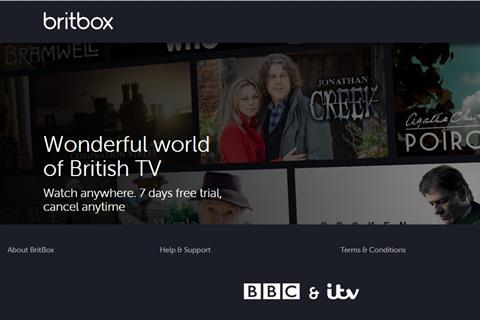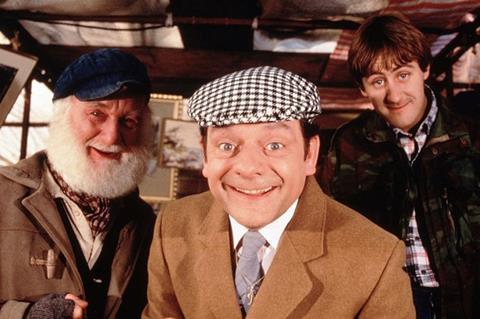Can the streaming service planned by the BBC and ITV compete with the might of Netflix and Amazon, plus upcoming offerings from Apple, Disney and AT&T?
When Britbox, the UK streaming service planned by the BBC and ITV, launches in the late autumn it will certainly address a gap in the market.

While British television is admired around the world there has never been a UK streaming service dedicated to the best of British programming.
- Read more: BBC & ITV to launch UK-based Netflix rival
It is a burgeoning sector of the media market already dominated by Netflix and now increasingly overshadowed by the California tech giants.
Is the late arrival of Britbox the result of British insularity, sluggishness or the unwillingness of old broadcasting rivals to work together?
Hardly. The BBC, ITV and Channel 4 were pioneers when they tried to launch a joint on-demand service nearly a decade ago, Project Kangaroo, only to see it killed off by Competition regulators.
The chairman of the Competition commission Peter Freeman decided at the time that the joint venture “would be too much of a threat to competition in this developing market and has to be stopped.”
“How does small and late Britbox fit into this maelstrom of streaming services dominated already by multi-billion American players, with more competition to come?”
To protect competition that didn’t exist, and never actually came to exist in the UK, a potentially viable British project was stopped in its tracks. We will never know what might have been achieved but now it is certain that Britbox, the successor to Kangaroo, is going to face serious headwinds.
As planning continued for the Britbox launch, Apple announced major initiatives in the streaming and news market. New streaming services are also on the way from Disney, Discovery and AT&T. That’s not to mention existing competition from Netflix, which has 10 million UK subscribers in the UK, as well as YouTube and Amazon Prime.
- Read more: Going niche: Competing with the OTT giants
An important dynamic in the streaming market is the belated realisation by the US media majors of the monster competitor they helped to create by licencing their back catalogue to Netflix.
Now they are running down their content deals with Netflix and concentrating on their own streaming services. Netflix, meanwhile, has more than 140 million subscribers worldwide and the financial firepower to concentrate on more high-end originals.
How does small and late Britbox fit into this maelstrom of streaming services dominated already by multi-billion American players, with more competition to come?
Carolyn McCall, chief executive of ITV, was asked recently if Britbox – through no fault of British broadcasters – is too little too late in the face of the threat from the American majors.
McCall replied that Britbox would not be competing against high profile American content but would occupy its own space – featuring the best of British from the past, present and future. It would offer everything from Only Fools and Horses to Broadchurch, Morse and Line or Duty for a monthly fee that would be competitive with Netflix. The basic Netflix fee is £5.99 a month.

The ITV chief executive wasn’t revealing any subscriber target forecasts, but noted that the very different North American version of Britbox, tailored for the Anglophile market ,had already moved into profit and had more than 500,000 subscribers.
Talks are also under way with both Channel 4 and Channel 5 about Britbox involvement. It is not always easy for former rivals to get together. There are different approaches and historic rights entanglements and it is far from clear how much content on Britbox will be exclusive to the service or when.
The BBC, for example, recently sold 700 hours of box set programming to Sky. McCall says she knew about the deal and is fine with it, but it scarcely adds lustre to Britbox. Meanwhile, BBC Studios recently signed a major global content deal with Discovery for its new international streaming service. Programme rights for the UK, Ireland and China are not included.
There are also differences of approach on distribution windows, with ITV sending its programmes to Britbox after a month on the ITV Hub. However, the BBC would like to have its programmes available on the iPlayer for up to 12 months because that is seen as the fairest deal for licence payers. This in turn is complicated because communications regulator Ofcom fears this could represent a considerable expansion of iPlayer use and has ruled that the proposal should face a formal public interest test. If the BBC gets its way it could be 12 months before new BBC programmes find their way to Britbox.
Whatever the detail, it is certain that the broadcasting and content industries are in the middle of a massive trend towards subscription streaming services. What will their impact be on existing broadcasters and indeed on satellite operators such as Sky?
“No matter how great the difficulties, broadcasters such as the BBC and ITV have to enter the stream with Britbox. It is the way the flow of the industry is going, and cannot be ignored.”
The best judgment still is that linear TV, now watched by 90 per cent of the UK population every week, will remain the significant mass medium despite further fragmentation of the audience. According to Enders Analysis, existing broadcasters will still account for two thirds of total video viewing by 2028 although that is down sharply from around 80 per cent at present.
One real possibility is that the growing number of streaming services will fight each other for revenues and viewers’ eyeballs within a growing but still minority sector. It will work for them – or most of them - because they can mine the world for subscribers although churn could be an unwanted guest.
Increasingly viewers will opt to pay for multiple, relatively low-cost streaming services to complement their traditional viewing. Consultants Deloitte, as part of their Future of TV research, believes that by 2028 UK households be subscribing to an average of three such services.
The Sky group, bought by Comcast for $86 billion, could face pressure on its large programme packages from consumers trading down to traditional TV plus, say, a combination of Netflix, Britbox and Disney +.
- Read more: How to join the SVOD party
In future live sports could become even more important to Sky as the glue that hold the big bundles together.
Whatever happens, and no matter how great the difficulties, broadcasters such as the BBC and ITV have to enter the stream with Britbox. It is the way the flow of the industry is going, and cannot be ignored.
























No comments yet